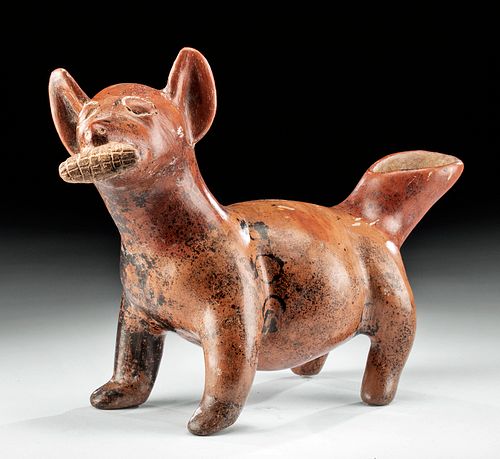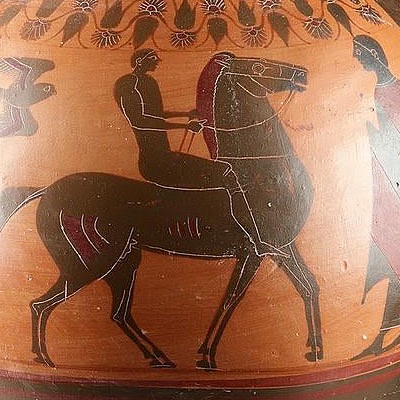Adorable Colima Redware Dog Vessel w/ Maize
Lot 149b
About Seller
Artemis Gallery
686 S Taylor Ave, Ste 106
Louisville, CO 80027
United States
Selling antiquities, ancient and ethnographic art online since 1993, Artemis Gallery specializes in Classical Antiquities (Egyptian, Greek, Roman, Near Eastern), Asian, Pre-Columbian, African / Tribal / Oceanographic art. Our extensive inventory includes pottery, stone, metal, wood, glass and textil...Read more
Categories
Estimate:
$3,500 - $5,000
Absentee vs Live bid
Two ways to bid:
- Leave a max absentee bid and the platform will bid on your behalf up to your maximum bid during the live auction.
- Bid live during the auction and your bids will be submitted real-time to the auctioneer.
Bid Increments
| Price | Bid Increment |
|---|---|
| $0 | $25 |
| $300 | $50 |
| $1,000 | $100 |
| $2,000 | $250 |
| $5,000 | $500 |
| $10,000 | $1,000 |
| $20,000 | $2,500 |
| $50,000 | $5,000 |
| $100,000 | $10,000 |
| $200,000 | $20,000 |
About Auction
By Artemis Gallery
Jun 4, 2020
Set Reminder
2020-06-04 10:00:00
2020-06-04 10:00:00
America/New_York
Bidsquare
Bidsquare : Exceptional Antiquities, Asian, Ethnographic
https://www.bidsquare.com/auctions/artemis-gallery/exceptional-antiquities-asian-ethnographic-5185
An important one-day auction featuring museum-worthy examples of Egyptian, Greek, Roman, Etruscan, Near Eastern, Far East / Asian, Pre-Columbian, African / Tribal, Oceanic, Native American, Spanish Colonial, Russian, Fossils, Ancient Jewelry, Fine Art, so much more! Artemis Gallery info@artemisgallery.com
An important one-day auction featuring museum-worthy examples of Egyptian, Greek, Roman, Etruscan, Near Eastern, Far East / Asian, Pre-Columbian, African / Tribal, Oceanic, Native American, Spanish Colonial, Russian, Fossils, Ancient Jewelry, Fine Art, so much more! Artemis Gallery info@artemisgallery.com
- Lot Description
Pre-Columbian, West Mexico, Colima, ca. 300 BCE to 300 CE. A wonderful example of a hand-built pottery dog vessel that is highly burnished and covered in red-orange slip. The playful canine stands with a plump body atop four bent legs, has a broad, cylindrical tail that doubles as the spout, and has a tapered neck. The head is held high and bears incised, almond-shaped eyes, a squat snout with a petite nose, a pair of enormous ears, and a narrow mouth that holds an ear of maize within, perhaps as a means of fattening it up for later consumption. Size: 11.3" L x 4.625" W x 8.25" H (28.7 cm x 11.7 cm x 21 cm)
Scholars know of at least two types of Colima dogs, one to be fattened up and ritually sacrificed or eaten and one to serve as a watchdog and healer of the ill. This plump hairless canine known as a Chichi or Escuintla is thought to be related to the Chihuahua or Mexican Hairless also known as the Xoloitzcuintle. The Xolo dog was named for the deity Xolotl, the God of the Underworld, and believed to guide the deceased as they journeyed to the afterlife. Colima vessels such as this one were buried in shaft tombs to protect the deceased and provide sustenance for eternity.
Provenance: ex-Barakat Gallery, Beverly Hills, California, USA, acquired prior to 2000
All items legal to buy/sell under U.S. Statute covering cultural patrimony Code 2600, CHAPTER 14, and are guaranteed to be as described or your money back.
A Certificate of Authenticity will accompany all winning bids.
We ship worldwide and handle all shipping in-house for your convenience.
#155891Repair to left foreleg, with resurfacing and overpainting along break lines. Minor abrasions along legs, body, spout, and head, with light encrustations within some recessed areas, and fading to areas of original pigmentation. Light earthen deposits and wonderful manganese blooms throughout.Condition
- Shipping Info
-
All shipping is handled in-house for your convenience. Your invoice from Artemis Gallery will include shipping calculation instructions. If in doubt, please inquire BEFORE bidding for estimated shipping costs for individual items.
-
- Buyer's Premium



 EUR
EUR CAD
CAD AUD
AUD GBP
GBP MXN
MXN HKD
HKD CNY
CNY MYR
MYR SEK
SEK SGD
SGD CHF
CHF THB
THB
















